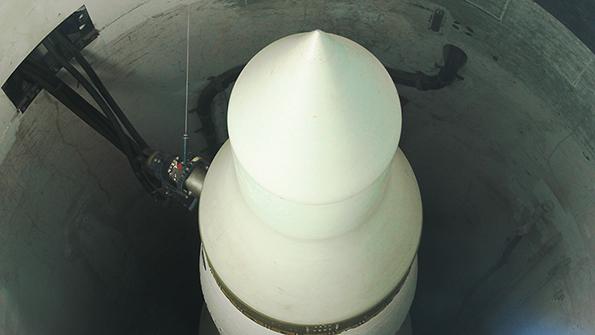
Short of funds to modernize the nuclear and conventional weapons inventory simultaneously, the U.S. Air Force’s military commander on July 1 warned of “significant trades” or a shift to a financing model last used during the Reagan administration.
“This will be the first time that the nation has tried to simultaneously modernize the nuclear enterprise while it’s trying to modernize an aging conventional enterprise,” said Gen. David Goldfein, speaking during a videoconference hosted by the Brookings Institution.
“The current budget does not allow you to do both,” he added. “So there are either going to be significant trades made or, we’re going to have to find a fund for strategic nuclear deterrence that we can use to modernize, which is the way we did it back in the Reagan era.”
The Navy already uses the National Sea-Based Deterrence Fund to pay for development of the Columbia-class ballistic missile submarine, but the Air Force has no equivalent financing structure for the B-21 bomber, Ground-based Strategic Deterrent (GBSD) and Long-Range Standoff (LRSO) cruise missile.
“I do believe we have to have a debate about the way we're going to fund this essential part of ... our military,” Goldfein said.
Only hours after Goldfein remarks, a debate was underway in the House Armed Services Committee (HASC) about the future of GBSD. The committee members continued to support the program as they debated the final version of the fiscal 2021 defense authorization bill, but an argument arose over an amendment that proposed studying an alternative path.
Rep. John Garamendi, a California Democrat, submitted the amendment, which was endorsed by HASC Chairman Rep. Adam Smith, a Democrat from Washington. The amendment called for an independent review of the possibility of a service-life extension program for the LGM-30 Minuteman III ICBM, which the GBSD would replace.
The proposal echoed a similar amendment that failed last year in conference committee. The difference this time was that Garamendi called for a study on a 50-year life extension project, rather than an 80-year proposal.
“Do we really have a problem with the Minuteman III aging out any time soon? There’s some indication that they won’t,” Garamendi said.
Later, Garamendi clarified that the “indication” was a comment made by an Air Force official in testimony last year, in which a lieutenant general said there was still “one more opportunity to extend the Minuteman to 2050.”
“What I’m trying to get at here is what did [the Air Force general] mean?” Garamendi said.
Rep. Michael Turner, an Ohio Republican and outspoken GBSD supporter, countered that the right thing to do was to send a letter to the general asking him to clarify his remarks, not propose an amendment to the defense authorization bill.
“I’ll join with you,” Turner said, “on a letter.”
A vote by the full committee rejected Garamendi’s proposed study, yielding the same result for the second year in a row.
But Smith, who supposed Garamendi’s amendment, suggested the debate wasn’t over. Both he and Garamendi support a nuclear deterrent, but question whether GBSD is necessary.
“What I do question is the idea that we have to build more and more and different weapons to accomplish that deterrent,” Smith said.
